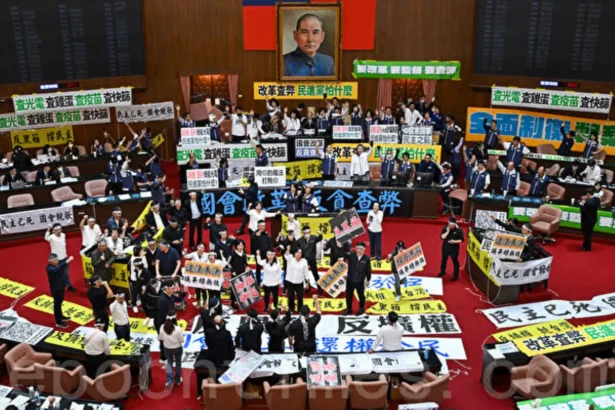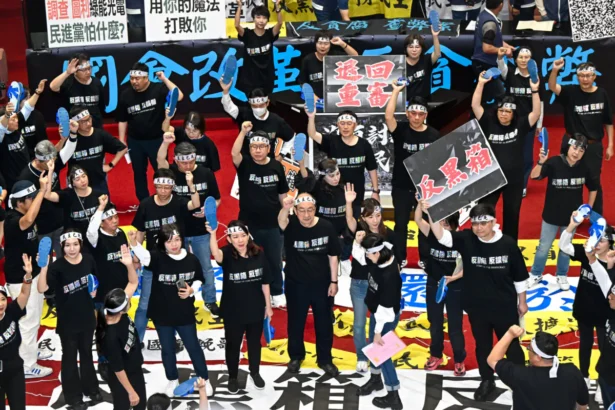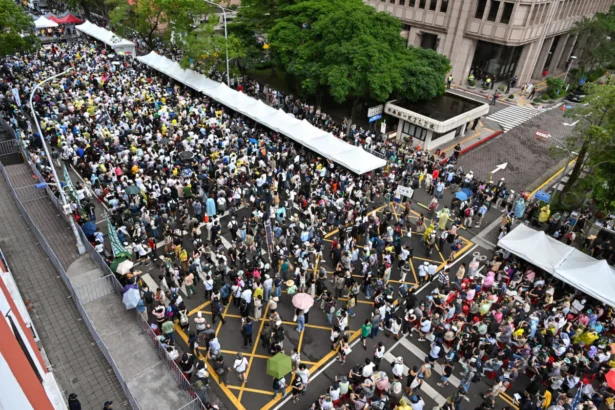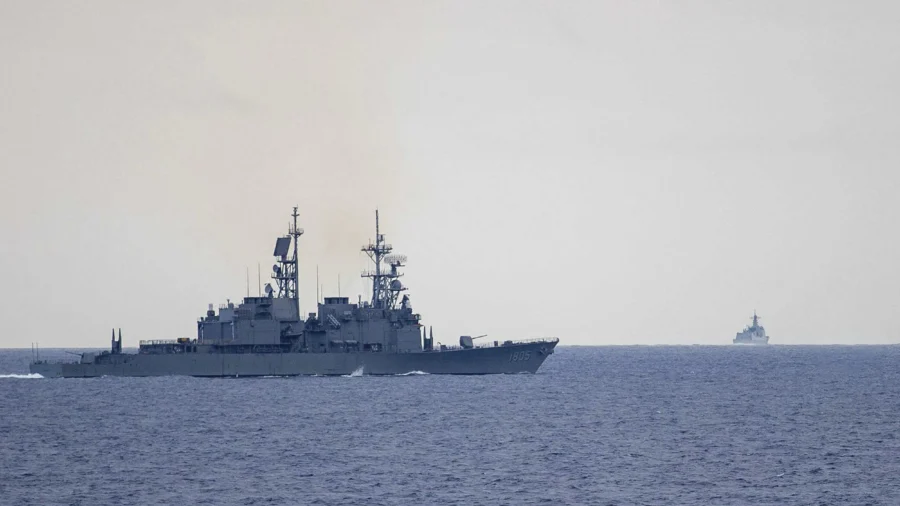The Eastern Theater Command of the Chinese Communist Party (CCP) launched a two-day military exercise, Joint Sword-2024A, in the maritime and airspace surrounding Taiwan. This maneuver coincided with the recent inauguration of Taiwan’s President Lai Ching-te and Vice President Hsiao Bi-khim from the Democratic Progressive Party (DPP) on May 20. Analysts view this deployment as a demonstration of the CCP’s strategic readiness.
Earlier, a confidential directive from the communist leadership indicated that the focus of engagement was within the parliament, corresponding to recent turbulence within Taiwan’s legislative body. This strategy aims to undermine Taiwan’s unity and potentially escalate tensions in the Taiwan Strait. However, they may have underestimated the awareness among Taiwan’s younger generation regarding the CCP’s tactics.
On May 23, Taiwan’s Ministry of National Defense condemned the PLA’s provocative actions that undermine regional peace and stability.
“We seek no conflicts, but we will not shy away from one to ensure our nation’s safety and protect our beautiful homeland,” the Ministry stated on X, formerly Twitter.
The Parliamentary Chaos
Prior to President Lai Ching-te’s inauguration, intense debates over parliamentary reform bills on May 17 sparked physical altercations among lawmakers from various parties, resulting in injuries to five DPP legislators and one Kuomintang (KMT) legislator, who were hospitalized.
On May 21, the Legislative Yuan resumed sessions where the opposition KMT and Taiwan People’s Party (TPP) swiftly pushed through around 20 amendments, including provisions forbidding officials from refusing to answer questions, punishable as “contempt of Parliament,” potentially leading to criminal charges.
The DPP criticized the KMT and TPP for unilaterally advancing “unconstitutional power-abuse legislation” without bipartisan negotiation, labeling the process undemocratic and the content as undermining constitutional governance. In defense, the KMT argued that these reforms aimed to enhance legislative oversight over the executive branch. KMT legislator Chen Yu-chen criticized the DPP’s boycott of the legislation, attributing it to their tendency to monopolize power.
Outside the Legislative Yuan that day, more than 40 civil organizations convened for a day-long protest against the abuse of legislative powers. Beginning at 6 a.m., the demonstration saw the crowd grow steadily throughout the day, with organizers estimating it had surged to 30,000 by evening.
The civil protest, in the name of “I Contempt Parliament,” is expected to continue through May 24 across the island.

CCP’s Intimidation Tactics
Tang Jingyuan, a China affairs specialist, told the Chinese language edition of The Epoch Times that the drill was a meticulously planned operation, “essentially a gift for Lai Ching-te’s inauguration.”
“The first major objective for the CCP is to assert dominance and exert pressure on Lai Ching-te through these military exercises, thereby influencing Taiwan’s future domestic and foreign policies. Essentially, this aims to instill caution within Lai Ching-te’s administration. It’s a typical CCP tactic of intimidation through military means to shape Taiwan’s internal and external policies.”
“The second objective is for the CCP to rally domestic support through these military exercises. … Displaying military strength serves to reassure the domestic audience and maintains high pressure against any notion of Taiwanese independence.”
Mr. Tang further explains the third objective: “The CCP aims to demonstrate a dual-pronged attack strategy by using military exercises alongside the Legislative Yuan turmoil erupting within Taiwan.”
“By conducting military exercises around Taiwan, the CCP is openly bolstering pro-Communist sentiments among sympathetic forces on the island, exacerbating internal unrest and intensifying pressure, ultimately fostering greater divisions and fragmentation within Taiwan.”
The Red Infiltration
Regarding the storm at Taiwan’s parliament, Mr. Tang believes there is deep-seated CCP infiltration, creating a situation of internal and external pressure. He explains this can be observed from three factors.
In February, individuals within the CCP system leaked information through overseas media, revealing that the CCP, through its Taiwan Affairs Office led by Wang Huining, planned to use Taiwan’s Legislative Yuan as a breakthrough point to undermine Taiwan internally.
Mr. Tang stated that this explicitly mentioned using the Legislative Yuan to promote so-called parliamentary reform bills to foment internal turmoil in Taiwan, thereby constraining the administrative authority of President Lai Ching-te in a form of restriction.
Secondly, Mr. Tang mentioned that Kuomintang’s parliamentary convener Fu Kun-chi led 16 KMT legislators to visit China, specifically meeting Mr. Wang, who is precisely the hidden hand behind the recent turmoil in the Legislative Yuan.
Thirdly, according to normal procedures, the so-called parliamentary reform bills could eventually be passed, albeit possibly after a longer period. However, they were rushed through in the shortest possible time using a “might makes right” approach, suggesting external factors or strong pressure from the CCP forcing this action.
“In essence, what we see in this military exercise is a coordinated effort from within and without, a dual-pronged attack, which is a common political tactic of the CCP. This deliberate violation of fundamental procedural norms is what makes the chaos in the Legislative Yuan so peculiar.”

Xi Jinping’s Secret Directive
The Australia-based legal scholar Yuan Hongbing once disclosed CCP head Xi Jinping’s new directive on united front work: “To completely disrupt and infiltrate Taiwan! The battlefield is in the Legislative Yuan!”
Following Mr. Xi’s directive, the CCP’s Taiwan Affairs Office swiftly proposed a strategy to Mr. Xi and Mr. Wang, and widely disseminated it to the CCP’s offices from central to local, in late January, said Yuan, according to Vision Times on Feb. 6.
CCP’s current strategy towards Taiwan can be summarized simply as using cognitive warfare, information warfare, and public opinion manipulation, along with united front tactics to influence certain pro-communist political figures within Taiwan, thereby causing turmoil first in Taiwan’s parliament, Mr. Yuan explained to The Epoch Times on May 23.
“Through these public opinion and information warfare tactics, they aim to undermine Taiwan’s societal resistance against CCP authoritarianism and military invasion.”
Mr. Yuan pointed out that a series of unconstitutional bills proposed by Taiwan’s opposition parties aim to create trouble for Lai Ching-te’s administration.
“At the same time,” he added, “the large-scale military exercises targeting Taiwan are evidently coordinated with the major disruptions within Taiwan’s Legislative Yuan, producing an effect of internal and external collusion to exert pressure on the democratically elected government of Lai Ching-te.”
The Sunflower Movement 2.0
On May 24, the Legislative Yuan continued to process legislation related to parliamentary reform, which has been criticized as an expansion of parliamentary powers. Concurrently, more than 60 civil organizations, including the Taiwan Citizens’ Front and the Economic Democracy Union, launched the “I Contempt Parliament” action across the island, demanding a halt to voting and requesting the bills to be sent back to committees for further review.

Organizers revealed that as of 3:30 p.m., there were already 20,000 people gathered outside the Legislative Yuan. By 5:30 p.m., it was reported that the crowd had exceeded 30,000.
Regarding the protest outside the Legislative Yuan, where 30,000 people gathered, Mr. Tang believes that the Taiwanese people have awakened, similar to the rise of a 2.0 version of the Sunflower Movement.
On March 18, 2014, hundreds of students and activists stormed and occupied the Legislative Yuan for 24 days to protest against the passage of the Cross-Strait Services Trade Agreement (CSSTA) with China by the then KMT-controlled Legislative Yuan without a clause-by-clause review.
Mr. Tang emphasizes that “the Taiwan Strait war has already begun. It is not only a political confrontation but also a battle between Taiwanese democracy and CCP interference.”
Cheng Jing, Luo Ya, Xiao Lusheng, and Zhong Yuan contributed to this report.
From The Epoch Times

